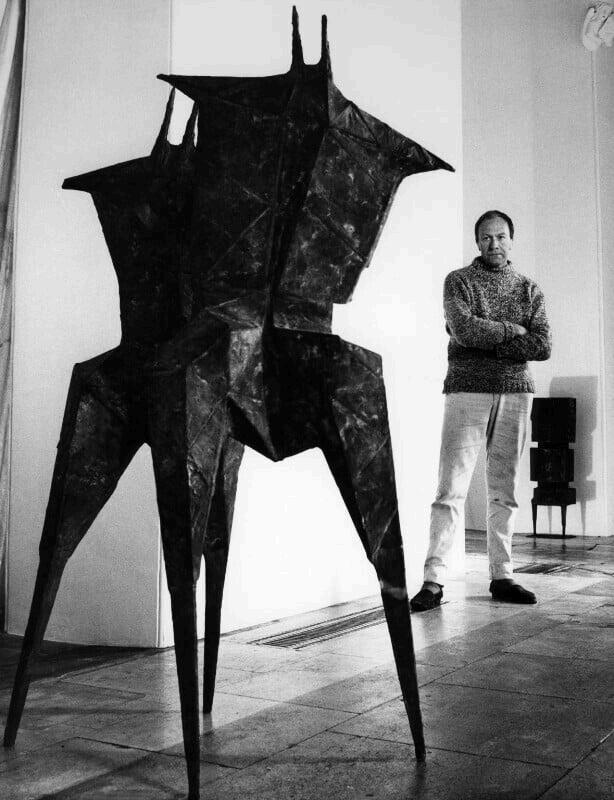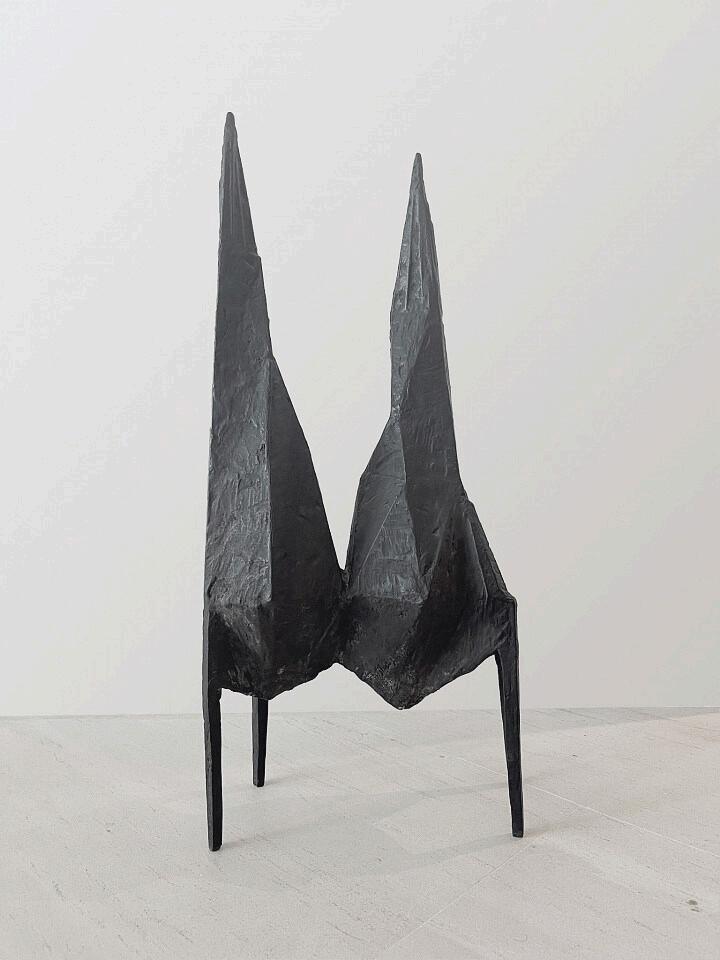

CHADWICK
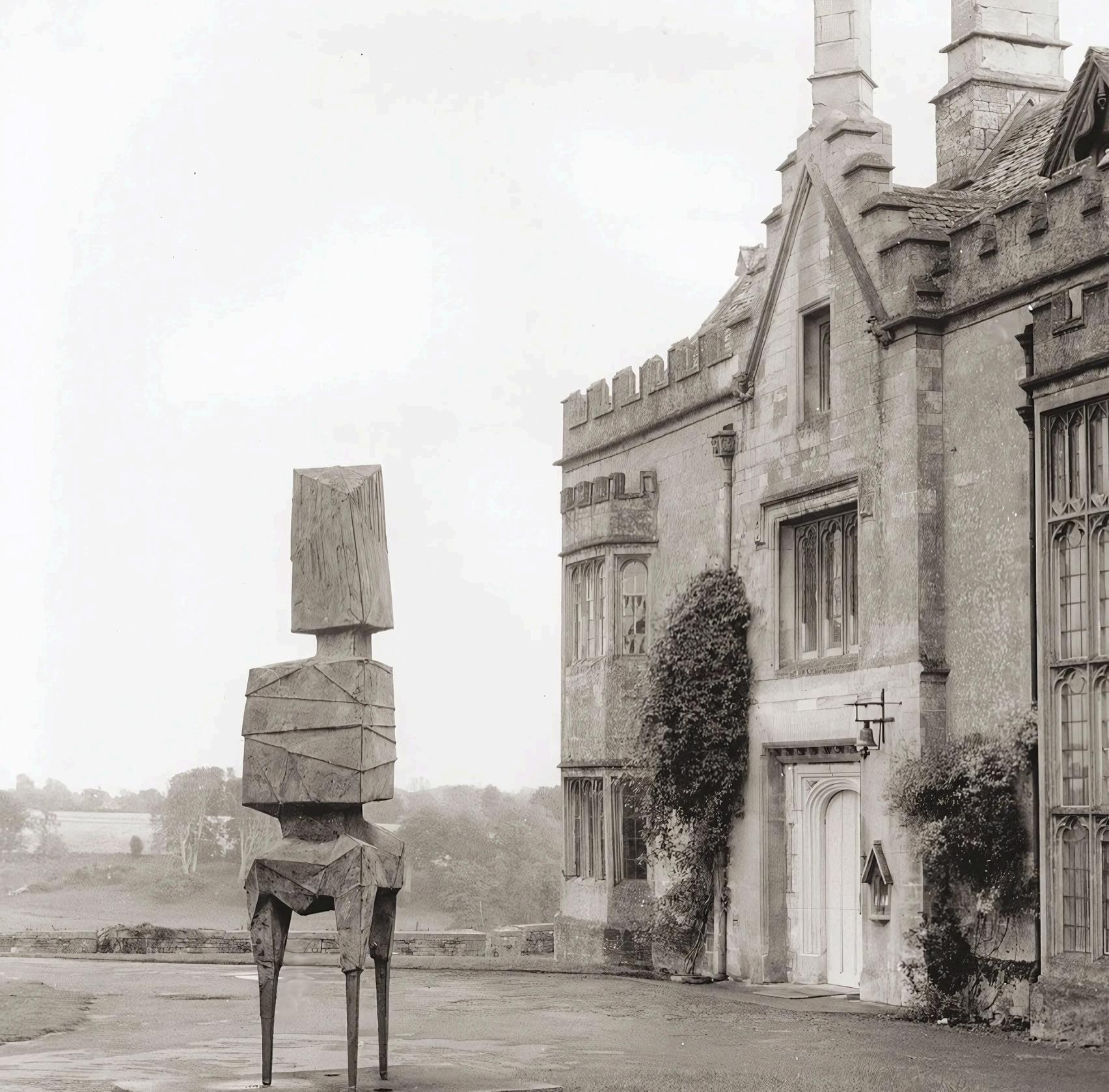

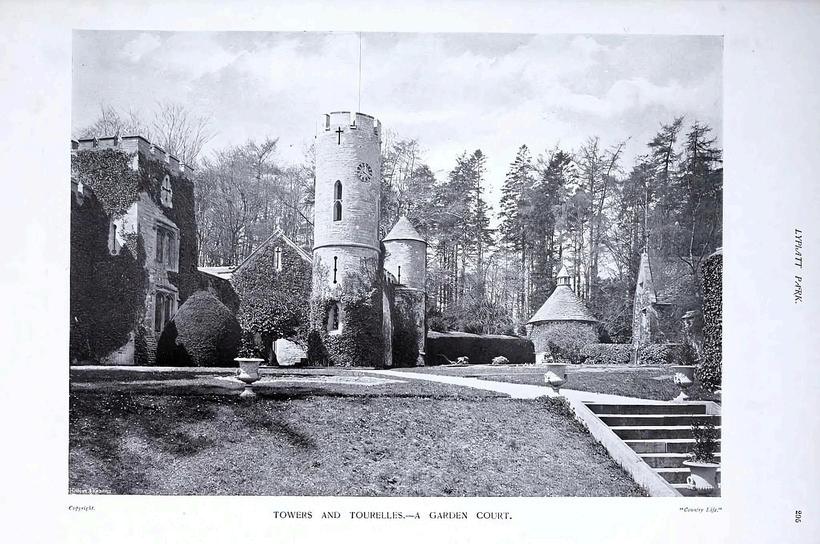

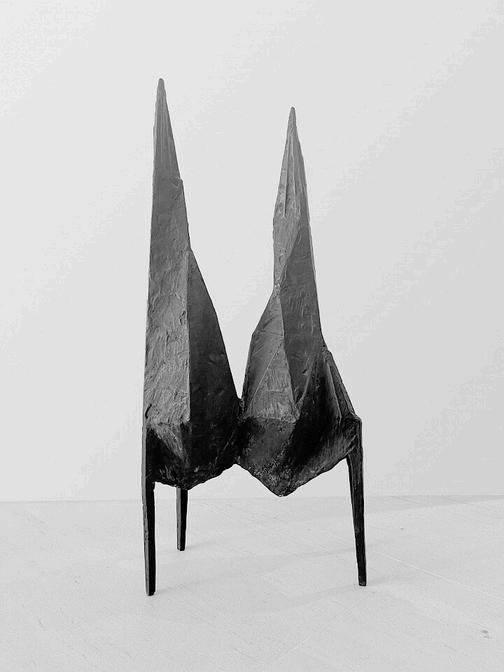
LYNNCHADWICK
Lynn Chadwick stands as one of the most significant British sculptors of the 20th century, known for his angular, anthropomorphic figures that bridge the gap between postwar existentialism and modernist abstraction Chadwick forged a distinct visual language rooted in welded metal and dynamic form, earning international acclaim with his 1956 Venice Biennale win


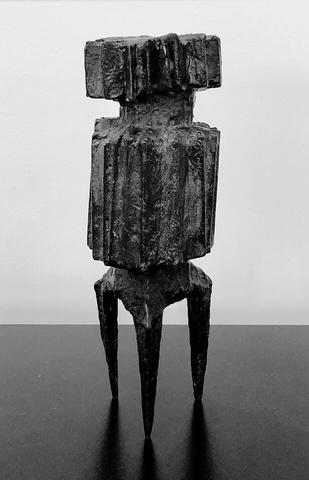
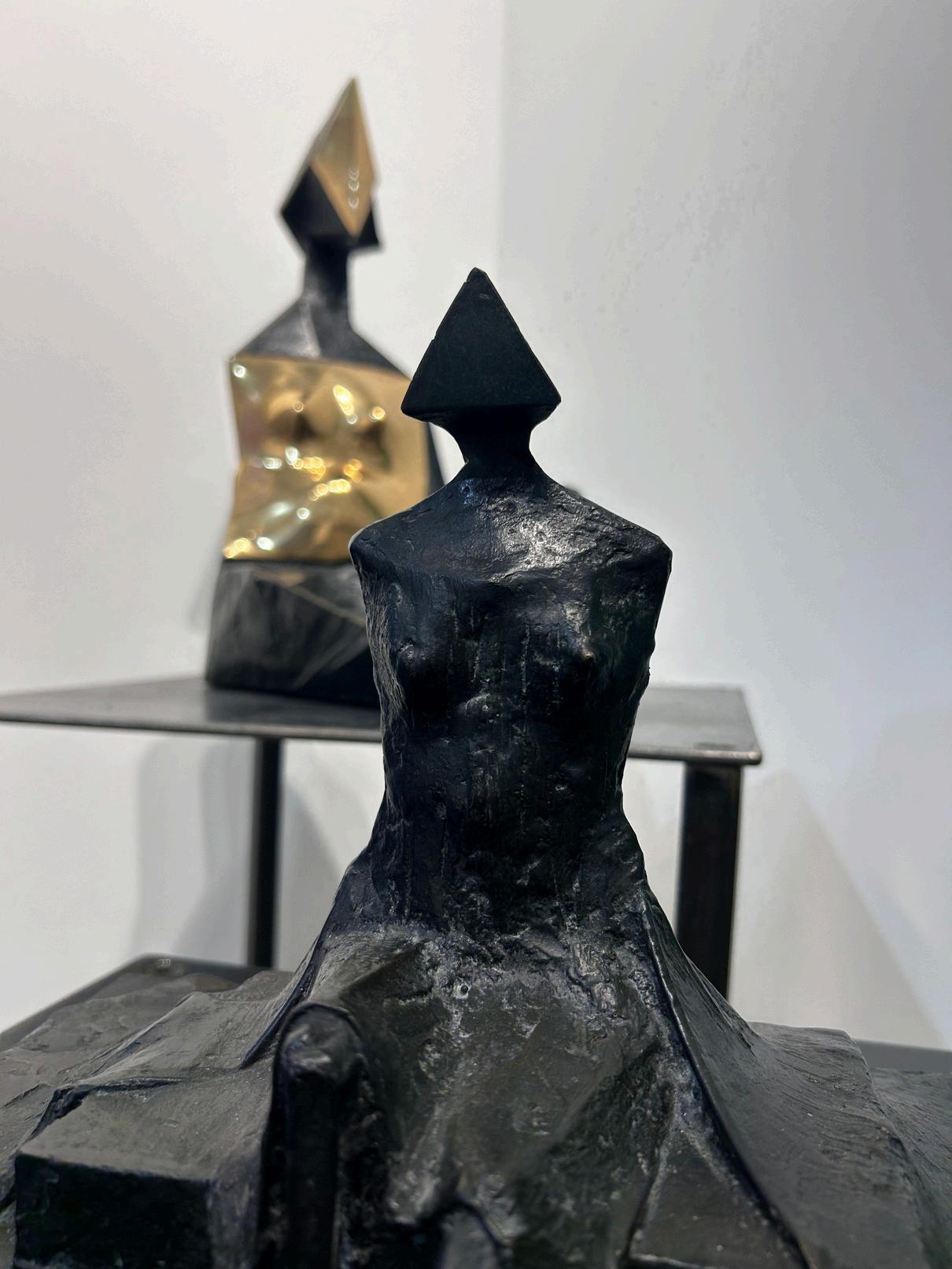


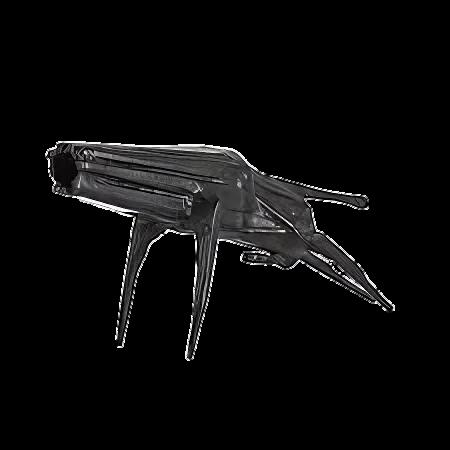
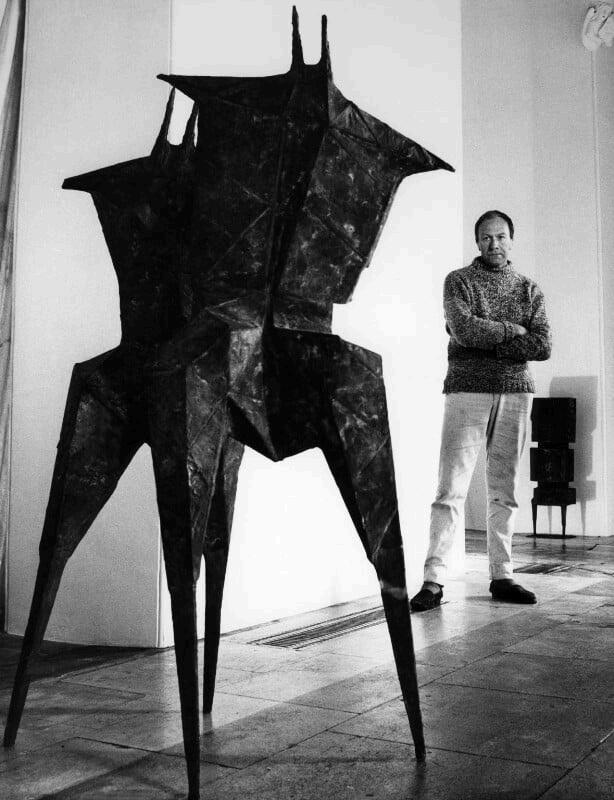
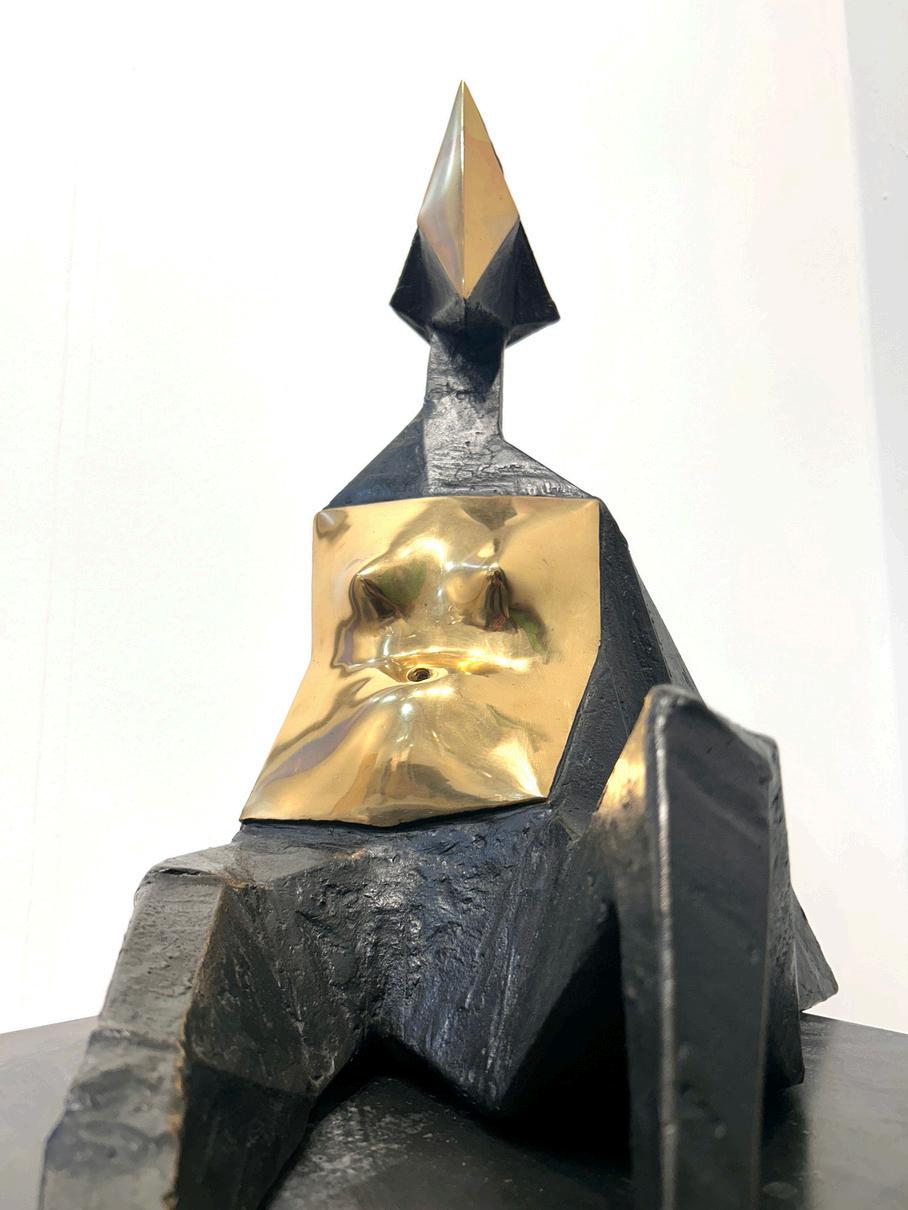
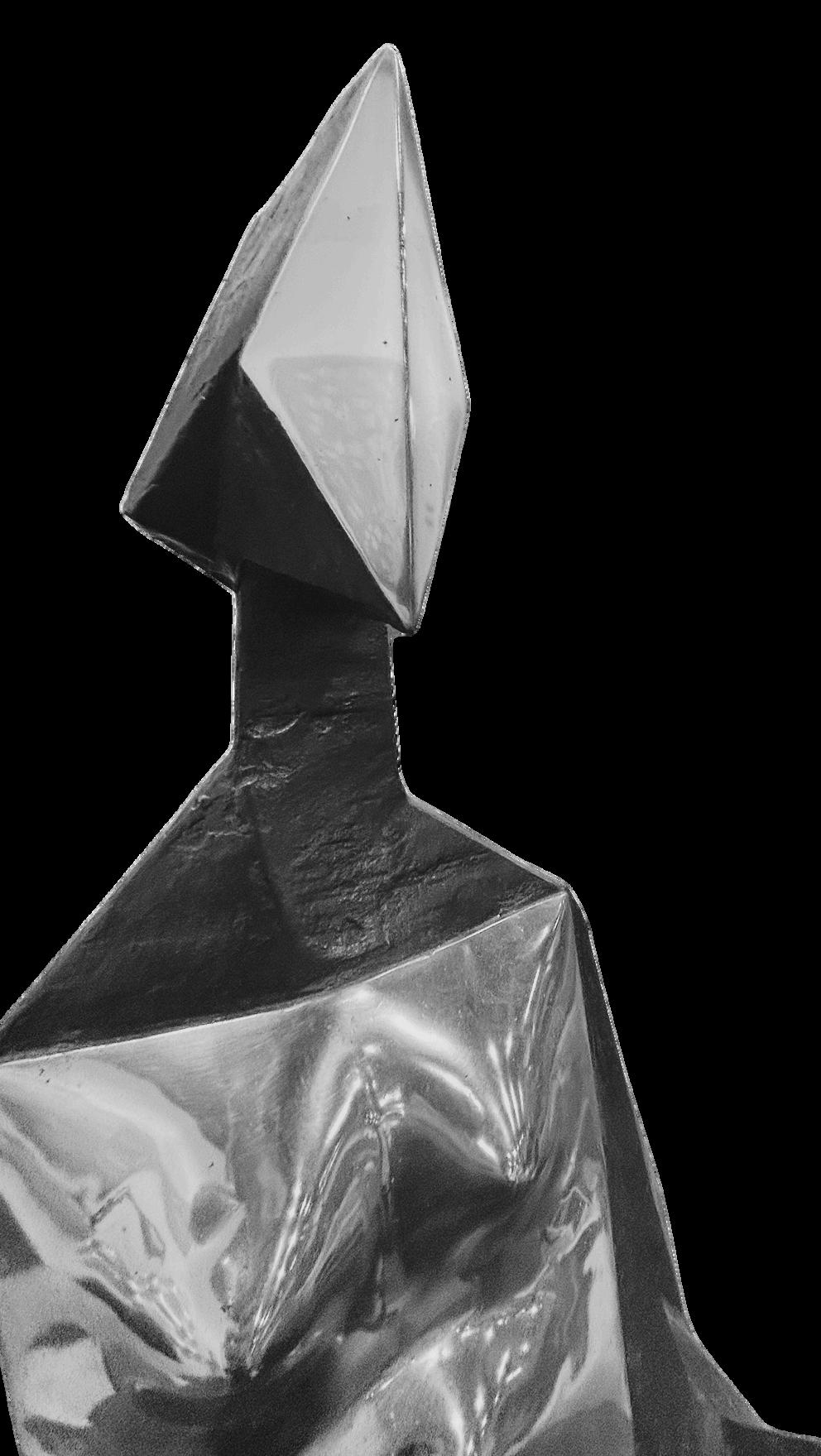


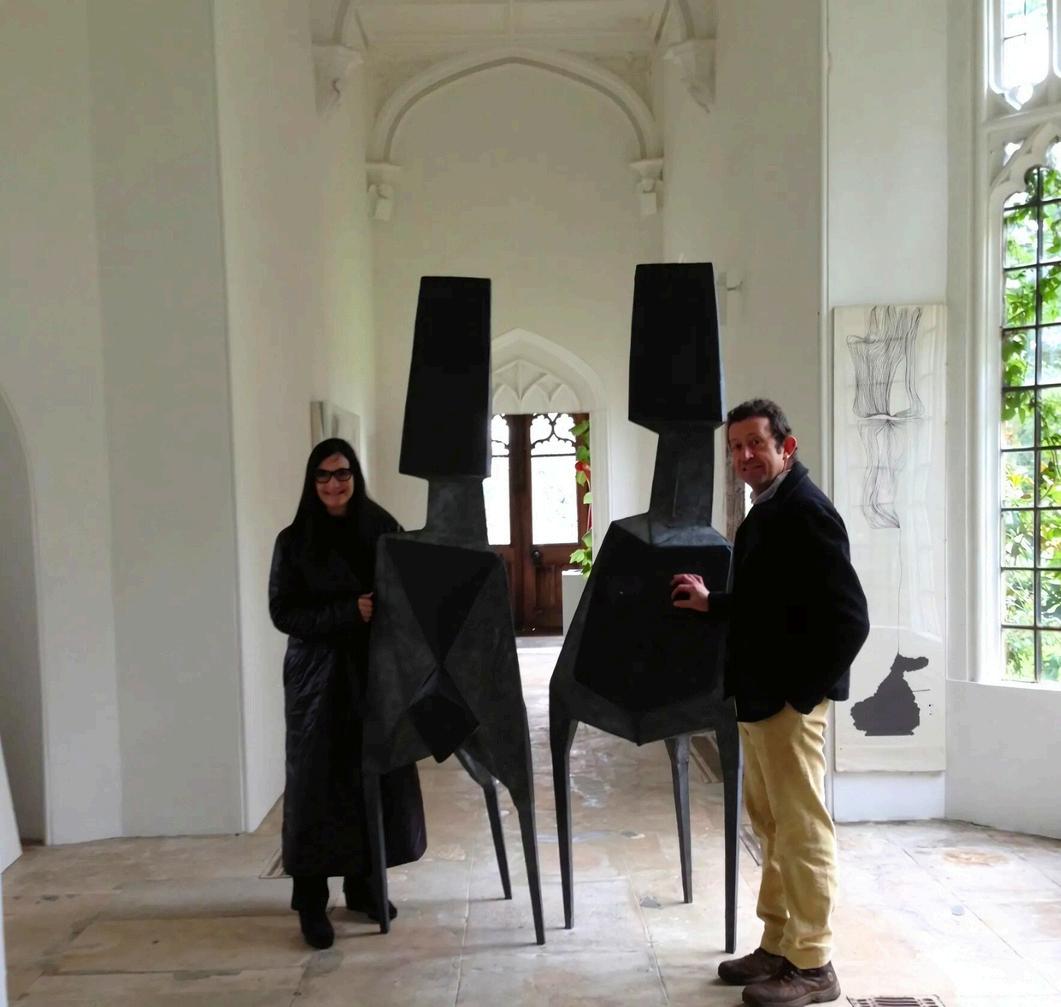

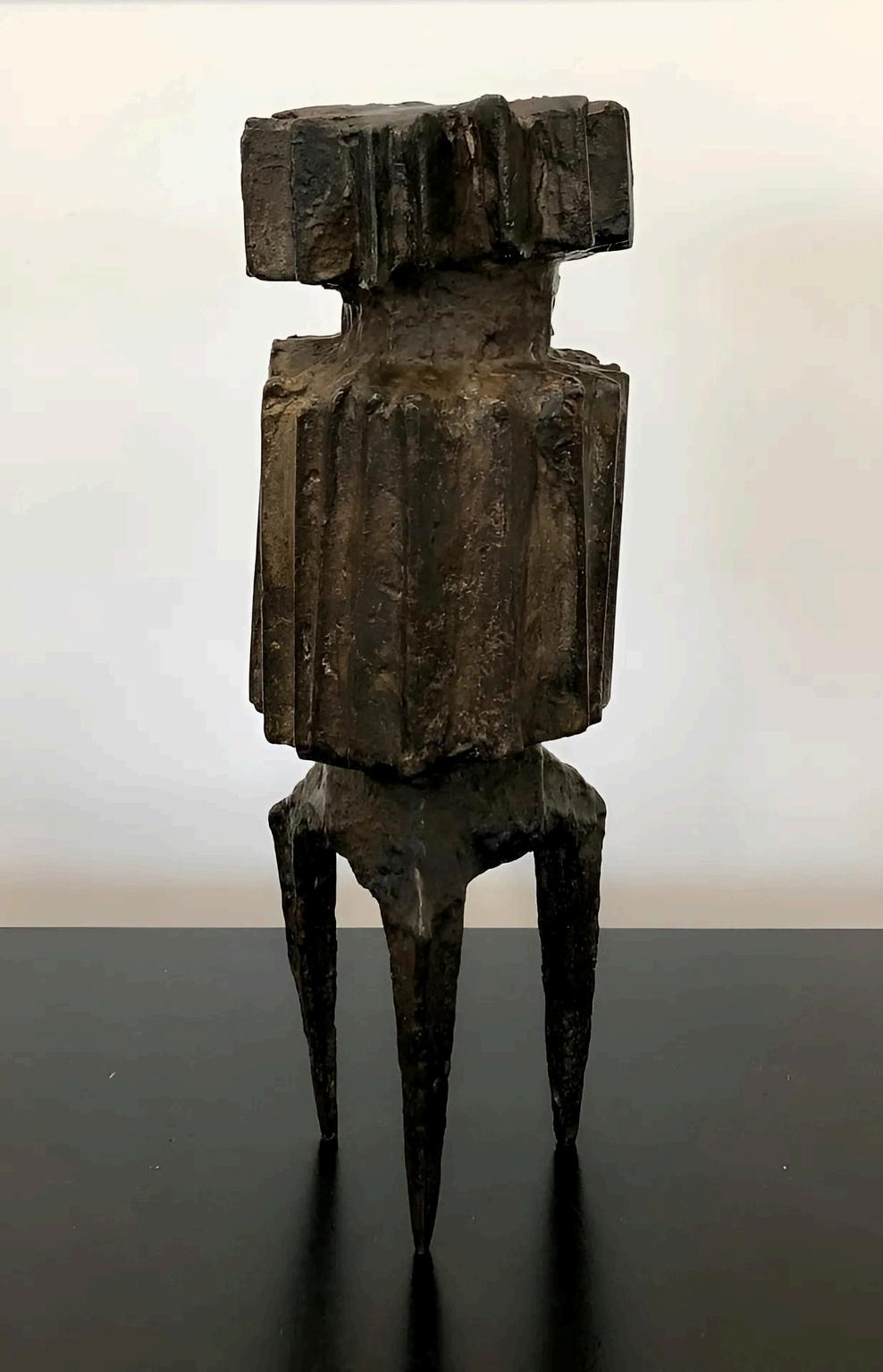
CAST IN BRONZE, THE FIGURE IS RENDERED WITH CHADWICK’S SIGNATURE GEOMETRIC CLARITY, HER BODY COMPOSED OF ANGULAR, FACETED PLANES AND A SHARPLY PYRAMIDAL HEAD THAT ABSTRACTS THE HUMAN FIGURE INTO A SYMBOL OF SERENE YET AUSTERE PRESENCE. THE SEATED POSE, MONUMENTAL IN POSTURE DESPITE THE SCULPTURE’S MODEST SCALE, SUGGESTS INTROSPECTION, REPOSE, OR PERHAPS WATCHFUL QUIETUDE
DRAPED IN RIGID, ARCHITECTURAL ROBES THAT FLOW OVER A STEPPED BASE, THE FIGURE EVOKES BOTH THE CLASSICAL SEATED DEITY AND THE MODERNIST MONUMENT THE ROBES BECOME PART OF THE SCULPTURE’S STRUCTURE, ANCHORING THE FIGURE IN PLACE WHILE OFFERING A RHYTHMIC TEXTURE THAT CONTRASTS WITH THE SHARP PRECISION OF THE TRIANGULAR HEAD AND SHOULDERS
THE CONTRAST BETWEEN FLUIDITY AND GEOMETRY SPEAKS TO CHADWICK’S MASTERY OF BALANCE BETWEEN HUMAN SOFTNESS AND ARCHITECTURAL FORM
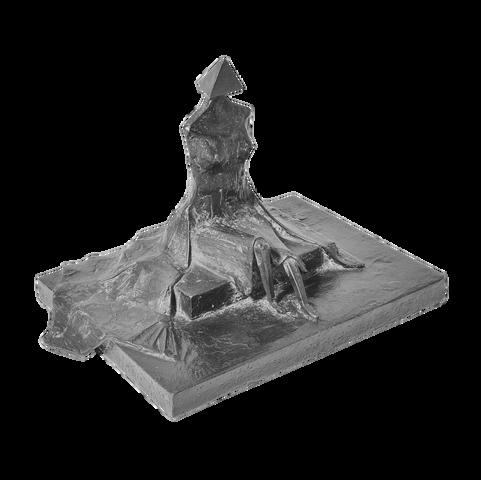
Edition 2/9, 1987 Bronze, 9 5 x 13 75 x 10 50 in

THIS SCULPTURE, PART OF HIS RENOWNED BEASTS SERIES, TRANSFORMS THE ANIMAL FORM INTO AN ANGULAR,
ALMOST ROBOTIC CREATURE, STRIDING FORWARD WITH SPINDLY, SHARPENED LEGS AND A JUTTING, AERODYNAMIC BODY THE FRONT-FACING APERTURE, LIKE THE MOUTH OF A CANNON OR SNOUT OF A SYNTHETIC ANIMAL, ADDS A HAUNTING AMBIGUITY PART ORGANIC, PART WEAPON
CHADWICK’S MANIPULATION OF LINE AND WEIGHT EMPHASIZES TENSION AND ALERTNESS. THE FOUR SHARPLY TAPERED LEGS ANCHOR THE CREATURE IN AN ASSERTIVE POSTURE,
WHILE ITS BODY NARROWS AND EXTENDS BACKWARD IN SLEEK, AGGRESSIVE PLANES THIS DESIGN RECALLS BOTH INSECTOID ANATOMY AND FUTURISTIC MACHINERY, SUGGESTING A HYBRID EXISTENCE POISED BETWEEN PREDATOR AND PROBE

LIONII LIONII
Edition 5/9, 1986
Bronze, 3 50 x 8 25
THIS SCULPTURE, PART OF HIS RENOWNED BEASTS SERIES, TRANSFORMS THE ANIMAL FORM INTO AN ANGULAR,
ALMOST ROBOTIC CREATURE, STRIDING FORWARD WITH SPINDLY, SHARPENED LEGS AND A JUTTING, AERODYNAMIC BODY THE FRONT-FACING APERTURE, LIKE THE MOUTH OF A CANNON OR SNOUT OF A SYNTHETIC ANIMAL, ADDS A HAUNTING AMBIGUITY PART ORGANIC, PART WEAPON
CHADWICK’S MANIPULATION OF LINE AND WEIGHT EMPHASIZES TENSION AND ALERTNESS. THE FOUR SHARPLY TAPERED LEGS ANCHOR THE CREATURE IN AN ASSERTIVE POSTURE,
WHILE ITS BODY NARROWS AND EXTENDS BACKWARD IN SLEEK, AGGRESSIVE PLANES THIS DESIGN RECALLS BOTH INSECTOID ANATOMY AND FUTURISTIC MACHINERY, SUGGESTING A HYBRID EXISTENCE POISED BETWEEN PREDATOR AND PROBE
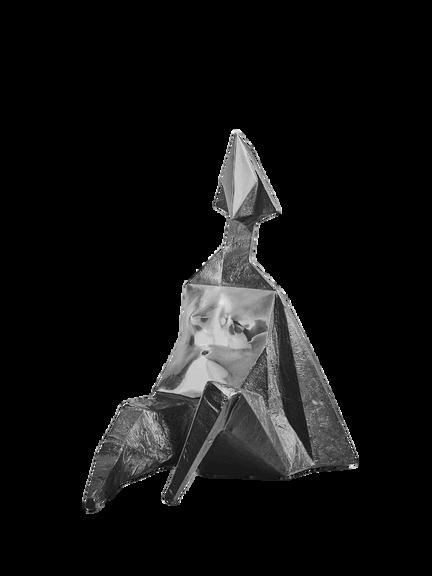
SITTINGELEKTRAII SITTINGELEKTRAII
Edition 2/4 1968
Bronze, 18 x 20 x 19 in (575)
TEACH CANDLE HOLDER ADOPTS A POISED, ALMOST STRIDING STANCE, SUGGESTING MOVEMENT AND PERSONALITY DESPITE THEIR MINIMALIST ANATOMY
THE TRIANGULAR, FLARED TOPS FUNCTION AS CANDLE SOCKETS BUT ALSO RESEMBLE HEADS OR HOODS, RECALLING THE HOODED FIGURES THAT POPULATED MUCH OF CHADWICK’S MID-CENTURY WORK
FUNCTION MEETS FORM HERE: THESE ARE UTILITARIAN OBJECTS, YET THEY EXUDE THE SAME SCULPTURAL GRAVITY AS CHADWICK’S LARGER PUBLIC COMMISSIONS
THEIR PRESENCE FEELS ARCHITECTURAL AND FIGURATIVE AT ONCE MODERN RELICS THAT CHANNEL THE TENSION, MYSTERY, AND BALANCE THAT CHADWICK MASTERFULLY CAPTURED IN METAL


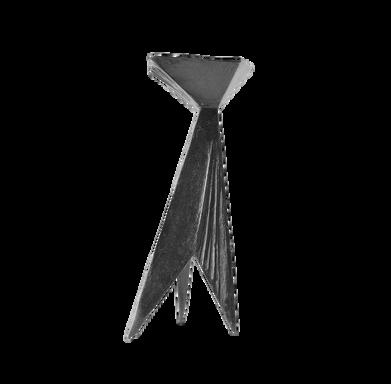
SINGLECANDLEHOLDER SINGLECANDLEHOLDER
Edition 2/4 1968
x 4.50 in | 9 75 x 5.50 x 3 in (C139, C141, C142)



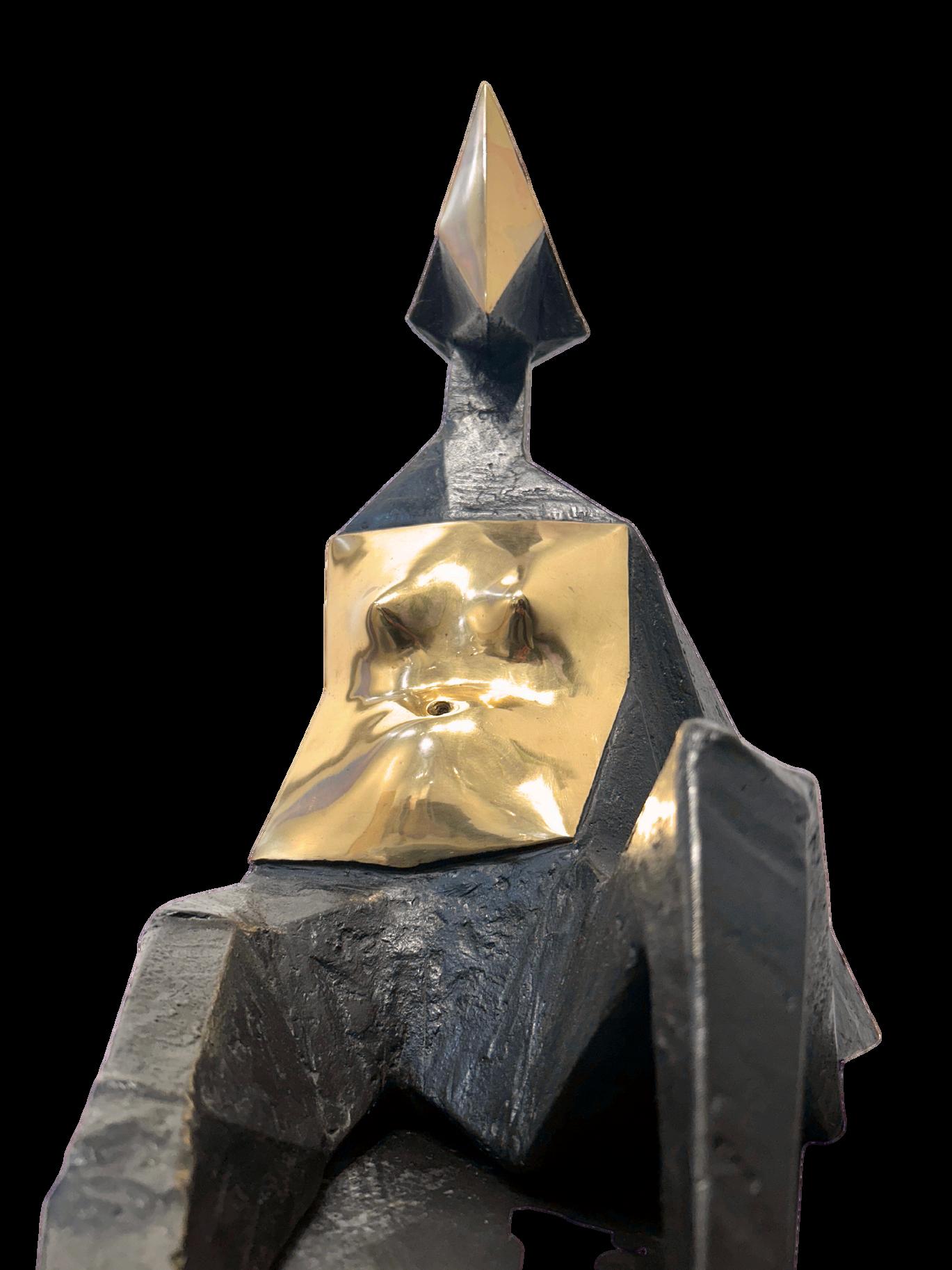
Lynn Chadwick: Biography
Lynn Chadwick (1914–2003) stands as one of the most significant British sculptors of the postwar period, renowned for his innovative exploration of form, materiality, and the human condition Born in Barnes, London, Chadwick initially trained not as a sculptor but as an architectural draftsman studying under the guidance of architect Roger Berthoud and later working with the architect Donald Hamilton His early exposure to architectural drawing profoundly influenced his later sculptural practice, fostering a meticulous sensitivity to structure, balance, and engineered form
Chadwick’s entry into the realm of sculpture came after World War II, where he served as a Royal Navy pilot in the Fleet Air Arm In the late 1940s, he began producing mobile constructions and welded metal forms, participating in exhibitions organized by the Arts Council of Great Britain His breakthrough arrived in 1952 when he was included in the seminal exhibition "New Aspects of British Sculpture" at the Venice Biennale, curated by Herbert Read Alongside figures such as Henry Moore, Barbara Hepworth, and Reg Butler, Chadwick was identified as part of a new sculptural generation whose work captured the existential anxieties and brutal realities of a postwar world Read famously described their creations as resembling "the geometry of fear" a term that would become synonymous with Chadwick's aesthetic
In 1956, Chadwick achieved international acclaim by winning the International Sculpture Prize at the Venice Biennale, triumphing over Alberto Giacometti This recognition established him as one of Britain's foremost artists, leading to major exhibitions across Europe, North America, and beyond His mature style is characterized by angular, often welded iron structures clad in bronze or steel, frequently depicting cloaked, hooded, or beastlike figures that straddle the boundary between human and animal Chadwick’s work eschews classical idealism embracing instead a language of armored surfaces, sharp planes, and precarious poise a sculptural vocabulary that embodies the psychological tensions of the 20th century
Lynn Chadwick: Expanded Curriculum Vitae
Born: November 24, 1914, London, England
Died: April 25, 2003, Gloucestershire, England
Solo Exhibitions (SELECT)
1950 Gimpel Fils London UK (First Solo Exhibition)
1956 Marlborough Fine Art London UK
1957 Lefevre Gallery London UK
1959 Durlacher Brothers Gallery New York NY USA
1962 Kunstverein, Hamburg, Germany
1965 Marlborough-Gerson Gallery, New York, NY, USA
1966 Kestner-Gesellschaft, Hanover, Germany
1967 Museo de Arte Moderno, Mexico City, Mexico
1971 Galerie Daniel Gervis, Paris, France
1972 Galerie de France, Paris, France
1973 Waddington Galleries London UK
1977 Knoedler Gallery New York NY USA
1985 Tate Gallery London UK (Major Retrospective)
1991 Yorkshire Sculpture Park Wakefield UK
1992 Hakone Open-Air Museum Hakone Japan (Retrospective)
1995 Galerie Von Bartha, Basel, Switzerland
1997 Marlborough Gallery, New York, NY, USA
2001 Sculpture at Lypiatt Park, Gloucestershire, UK (Permanent Estate Exhibition)
2003 Marlborough Fine Art, London, UK (Posthumous Exhibition)
2014 Blain|Southern, London, UK Lynn Chadwick Retrospective
2017 Blain|Southern Berlin Germany Lynn Chadwick: Beasts of the Times
Group Exhibitions (SELECT)
1952 "New Aspects of British Sculpture," Venice Biennale, Venice, Italy
1955 São Paulo Biennale São Paulo Brazil
1956 XXVIII Venice Biennale, Venice, Italy (Winner, International Sculpture Prize)
1958 World Exhibition of Sculpture, Philadelphia, PA, USA
1959 Documenta II, Kassel, Germany
1960 "British Sculpture in the Twentieth Century," Tate Gallery, London, UK
1961 Antwerp Biennale of Sculpture Middelheim Belgium
1963 "British Sculpture Since 1945," Guggenheim Museum, New York, NY, USA
1972 "Sculpture in the Twentieth Century," National Gallery of Art, Washington D C USA
1977 International Sculpture Exhibition, Hakone Open-Air Museum, Japan
1987 "Masters of Modern British Sculpture," Marlborough Fine Art London UK
1995 "The Geometry of Fear," Henry Moore Institute, Leeds, UK
2002 "From Moore to Gormley: Sculpture from the 1950s to the Present," Royal Academy of Arts, London, UK
2021 "Postwar British Sculpture," Pace Gallery, New York, NY, USA
Major Projects and Public Commissions (SELECT)
1951 Festival of Britain, London, UK (Architectural sculptures and reliefs)
1953 Tower Sculpture State House London UK
1960 Trigon, Technical University of Karlsruhe, Germany
1969 Beasts, University of California, Berkeley, USA
1971 Cloaked Figures Arts Council Collection UK
1974 Sitting Couple on Bench, Cass Sculpture Foundation, Goodwood, UK
1982 Cloaked Figures, Lypiatt Park, Gloucestershire, UK
1990 Pair of Walking Figures - Jubilee Sculpture, Regent’s Park, London, UK
1992 Retrospective Display, Hakone Open-Air Museum, Japan
Selected Literature (SELECT)
Whitfield, Sarah Chadwick London: Thames & Hudson, 1990
Pownall, David Lynn Chadwick Sculptor London: Lund Humphries 1991
Read, Herbert "New Aspects of British Sculpture," in Catalogue of the British Pavilion, XXVI Venice Biennale, 1952
Blain|Southern Lynn Chadwick Retrospective London: Blain|Southern 2014
Frances Carey and the Henry Moore Institute The Geometry of Fear: British Sculpture of the 1950s London: Henry Moore Foundation, 1999
Caro Anthony and Robert Melville British Sculpture: The Sixties London: Arts Council, 1963
Giedion-Welcker, Carola Contemporary Sculpture: An Evolution in Volume and Space New York: George Wittenborn, 1955
De Waal Edmund The White Road: Journey into an Obsession London: Chatto & Windus, 2015 (References Chadwick in context of postwar materiality)
Collections (Select)
Tate Gallery, London, UK
Museum of Modern Art (MoMA), New York, NY, USA
Centre Pompidou, Paris, France
National Gallery of Australia Canberra Australia
Hakone Open-Air Museum, Hakone, Japan
Walker Art Center, Minneapolis, MN, USA
Yale Center for British Art, New Haven, CT, USA
The British Council Collection, London, UK
Art Gallery of New South Wales, Sydney, Australia
Key Notes:
1956 Venice Biennale Prize: This is Chadwick’s most famous early career achievement it catapulted him to international prominence and beat out even figures like Alberto Giacometti
CBE (1964): One of Britain’s highest civilian honors for contribution to the arts very important to list formally
Royal Academician (RA): Prestigious membership at the Royal Academy, reserved for distinguished artists
Late-career honors (Hakone Yorkshire) emphasize global recognition especially in Japan where public sculpture is highly revered
